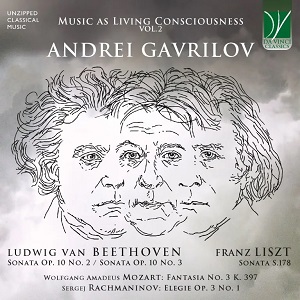Andrei Gavrilov beginnt das zweite Album seiner Reihe Music as Living Consciousness mit Mozarts Fantasie KV 397. Er nimmt den Titel Fantasie sehr ernst. Seine Interpretation ist sehr fantasievoll, sehr lebendig, sehr spontan, sehr kontrastreich und sehr persönlich.
Der Pianist spielt derart mit den Farben, mit Licht und Schatten, dass er mit seinem lebendigen Spiel neue Maßstäbe setzt. Er weiß um die dramatischen Effekte in Mozarts Musik und nutzt sie optimal, um die Musik ausdrucksvoll werden zu lassen.
Darauf folgt eine schelmisch-vitale Interpretation der 6. Beethoven-Sonate wiederum sehr persönlich, um nicht zu sagen eigenwillig. Aber nur ein Pianist, der derart mit der Materie vertraut ist, kann sich so von ihr lösen, um zu einer dermaßen freien und spontanen Interpretation zu gelangen. Dieselbe Freiheit und Spielfreude findet sich in der siebten Sonate.
Sehr eigenwillig in Rhythmik und Dynamik spielt Gavrilov dann die Liszt-Sonate, streckenweise wie improvisatorisch, dann wieder ekstatisch getrieben, manchmal recht harsch und ohne Rücksicht auf Verluste sowie mit etwas über 26 Minuten auch sehr schnell.
Nach dieser Parforce-Tour beschließt der Pianist sein Programm mit Rachmaninovs Etüde op. 3/1, teils sehr lyrisch und stimmungsvoll, teils dramatisch aufgewühlt.
Wer offen ist für spezielle Interpretationswege, für den kann diese CD ein Erlebnis werden. Ich selber war nicht schockiert und erlebte diese Interpretationen als spannenden Beitrag, freilich nicht ganz ohne ängstliches Erstaunen und Fragezeichen im Gesicht.
Andrei Gavrilov begins the second album of his Music as Living Consciousness series with Mozart’s Fantasy K. 397, and he takes the title Fantasy very seriously. His interpretation is very imaginative, very lively, very spontaneous, very rich in contrasts and very personal.
The pianist plays with colors, with light and shadow in such a way that he sets new standards with his lively playing. He knows about the dramatic effects in Mozart’s music and uses them optimally to make the music expressive.
This is followed by a mischievously vital interpretation of the 6th Beethoven Sonata, again very personal, not to say idiosyncratic. But only a pianist who is so familiar with the material can detach himself from it in such a way to arrive at a totally free and spontaneous interpretation. The same freedom and joy of playing is found in the seventh sonata.
Gavrilov then plays the Liszt Sonata very unconventionally in rhythm and dynamics, at times as if improvisational, then again ecstatically driven, sometimes quite harshly and without regard for losses, and, at just over 26 minutes, also very fast.
After this par force tour, the pianist concludes his program with Rachmaninov’s Etude op. 3/1, at times very lyrical and atmospheric, at others dramatically agitated.
If you are open to special ways of interpretation, this CD can be an experience for you. I myself was not shocked and experienced these interpretations as an exciting enrichment, admittedly not entirely without anxious astonishment and question marks on my face.




















